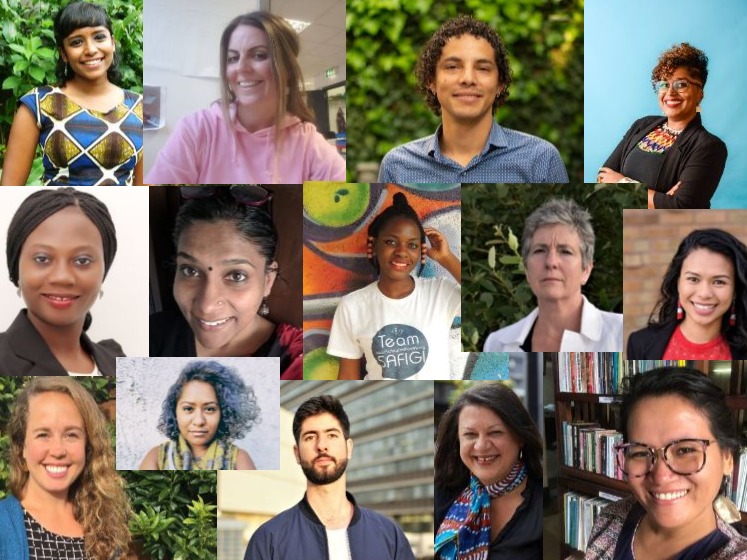
Change is coming – and the change-makers are coming to the International Inequalities Institute (III) at LSE. A Cambodian grassroots movement-builder and a sustainability strategist from Singapore; a Dalit rights activist and a Colombian transitional justice lawyer; a British tax justice expert and a Zambian internet governance specialist and girls’ safety campaigner are among the 14 new Atlantic Fellows for Social and Economic Equity.
In September 2019, the third cohort of Atlantic Fellows for Social and Economic Equity (AFSEE) will join a community that now numbers 52 current and lifelong Fellows from 26 countries across Africa, Asia, South and North America and Europe. The 2019-20 AFSEE cohort includes practitioners, policy-makers and educators, political activists and civil society professionals who have already achieved impact in fields such as financial inclusion, economic alternatives, labour organising, women’s and LGBT rights, environmental justice, public health and peacebuilding.
“We’re honoured to welcome these 14 courageous, collaborative change-makers to the III as they explore the causes of inequality and use values-led, collective leadership to work toward social and economic justice,” said Rana Zincir-Celal, director of the Atlantic Fellows for Social and Economic Equity programme. “During their time at LSE, the Fellows’ own rich and broad experience in challenging inequalities will offer a unique opportunity for III researchers and the LSE community to learn from them in return.”
Drawn from a globe-spanning pool of applicants, the Fellows will undertake an innovative one-year programme of engagement with researchers and campaigners, leadership training and narrative and communications skills, all built upon a rigorous, interdisciplinary academic course at LSE. Upon completion of their LSE year, they will join a lifelong catalytic community drawn from all seven Atlantic Fellows programmes working to advance fairer, healthier and more inclusive societies.
Among the 2019-20 cohort of Atlantic Fellows for Social and Economic Equity are:
- Madhumitha Ardhanari, a Singapore-based sustainability strategist and researcher with Forum for the Future, focuses on areas such as sustainable value chains and livelihoods, renewable energy and radical decarbonisation. She says: “The recent school strikes for climate justice remind me that we are capable of flourishing and thriving, even in the most difficult times, by connecting and loving across our differences.”
- Sophea Chrek, a grassroots movement-builder, campaigner and researcher in Phnom Penh, Cambodia, focuses on issues including food sovereignty and the environment, women’s and labour rights, public policy and governance. She notes: “I have worked with groups mobilising to end the exploitation of workers, especially women; with farmers calling for fairer markets and government support; and with people campaigning to access public health services.”
- Asha Kowtal is general secretary of the National Campaign on Dalit Human Rights in New Delhi, India. An anti-caste feminist activist, she has played a key role in organising Dalit women’s movements for the past decade. She observes: “For activists from marginalised communities, it is powerful to be propelled by the rage we feel against injustice and inequalities, but I believe that politics without compassion is not enough for social change.”
- Hobeth Martínez Carrillo, principal researcher at Dejusticia, the Centre for the Study of Law, Justice and Society in Bogotá, Colombia, works on the implementation of the 2016 peace agreement between the Colombian government and FARC-EP. A lawyer and academic, his areas of expertise include indigenous peoples’ rights, forced displacement and land reparations. He says: “Having the ability to look at things differently and therefore not accept today’s reality as immutable, is an essential value. If you are curious enough, you may find a way.”
- Esther Mwema, founder of Safety First for Girls Outreach Foundation (SAFIGI) in Lusaka, Zambia, is also president of Digital Grassroots, which works to increase the representation of underserved youth in internet governance. Esther, who is completing her first novel, observes: “As marginalised communities, we defend our human dignity by creating solutions for ourselves and telling our own stories. Although there are challenges, the future appears more open, inclusive and innovative. It is a world where a girl like me can become an Atlantic Fellow.”
- Liz Nelson, director of the Tax Justice Network, lives in Oxford, UK. She leads international, interdisciplinary collaborations between tax justice and human rights advocates, with a focus on gender justice and inequalities, and she played a key role in the Bogota Declaration on Tax Justice for Women’s Rights. She says: “What gives me hope is opportunities to strengthen democracy, a concept under such attack in our time. It is why I believe tax justice is so important — because it creates opportunities for all people, especially women, to have their voices heard.”